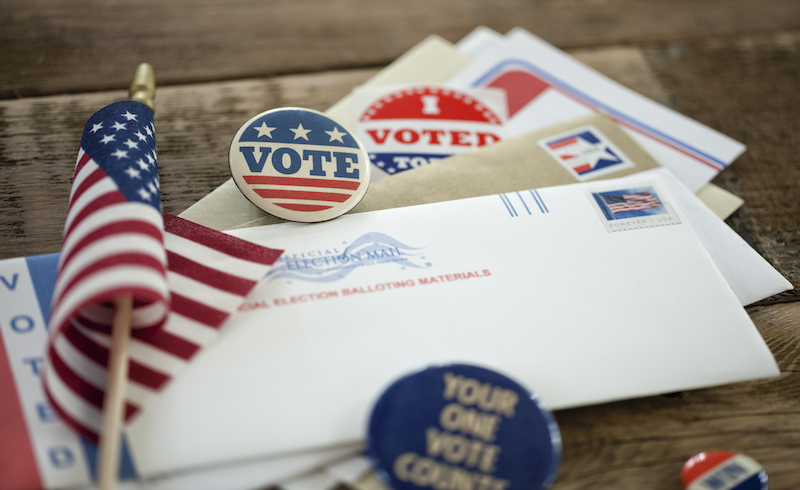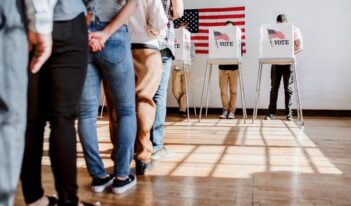
Congress should use its constitutionally granted authority to regulate elections and protect democracy.
Across the nation, Republican-controlled states have generated a tsunami of legislation making it more difficult to vote. For half a century, Americans have relied almost exclusively on federal courts to maintain a democratically legitimate system of free and fair elections, at all levels of government. Reliance on the courts is unfortunately no longer a viable solution. The only way to secure free and fair democratic processes is through direct regulatory intervention by the U.S. Congress.
America’s path toward genuinely fair electoral competition has been long and meandering. On one hand, regulatory innovations have greatly improved the capacity of elections to register accurately popular sentiment. These include expansion of the franchise, the secret ballot, the initiative and referendum, civil rights legislation, independent districting commissions, campaign finance regulation, convenience voting, and many others.
On the other hand, the United States has a long history of state legislative manipulation of the rules of democracy. From the suppression of representation in newly settled areas of the original colonies to the eponymous 1812 gerrymander of the Massachusetts senate, through Jim Crow restrictions on voter eligibility, state legislatures have sometimes undermined rather than facilitated fair expression of the voters’ will.
For much of American history, the only restraint on state legislative manipulation of elections was political—legislatures that went too far risked punishment by the voters. Often, a change in political control of the legislature simply resulted in a different set of manipulative measures calculated to entrench the new majority. For the first 50 years of the United States, for example, some states switched repeatedly between at-large and districted election of their House delegations depending upon which method yielded better results for the party controlling the state legislature.
Article I, Section 4 of the U.S. Constitution has long authorized Congress to regulate elections for federal offices—a power it has almost never used. Its most significant intervention occurred in the Apportionment Act of 1842, which required states to elect members of Congress from districts. Other measures, such as the Help America Vote Act of 2002 and the National Voter Registration Act of 1993, have been trivial in scope and impact.
Since the Reconstruction Era, Congress has also had the power under the 14th and 15th Amendments to protect racial and ethnic minorities from discrimination in voting, a power that it has also wielded sparingly, but with much greater effect: the Voting Rights Act of 1965 is often said to be the most successful civil rights law in U.S. history.
The vacuum in electoral regulation left by Congress was, however, filled to some extent by the U.S. Supreme Court. Over about 25 years in the mid-20th century, the Court repeatedly invoked the Constitution to invalidate longstanding practices of racial gerrymandering, malapportionment of election districts, restrictive voter eligibility rules, burdensome ballot access requirements, and restrictions on criticism of incumbent public officials, among many others.
In short, Congress has since the founding largely left the role of managing democracy to the states and to the federal courts. That position is no longer tenable.
First and foremost, the Republican Party itself is now the most significant threat to American democracy since the Jim Crow era. As political scientists have documented, the Republican Party has moved much farther to the right than the Democrats have moved left. The dismaying truth is that the Republican Party has now repudiated the liberal democratic consensus that dominated American politics since the end of World War II. The Republican Party has become instead a party of populist authoritarianism, fundamentally opposed to majoritarian democracy. Its principal mission since the 2016 election has been to use whatever power it holds to manipulate the rules of democratic engagement to entrench itself in power.
To this end, Republican-controlled states have in the last few years produced a flood of anti-democratic legislation. These laws have made voting more burdensome by limiting early voting and mail voting (even during a pandemic), reducing the number of polling places and ballot drop boxes, and heightening voter identification requirements.
Some measures reduce the professional independence of election administrators by subjecting them to criminal liability for minor errors, or by subjecting previously independent election boards to control by Republican-dominated legislatures. Georgia has since made it a crime to give water to someone waiting in a line to vote. Arizona conducted a“sham audit” of the 2020 election results. Hundreds of similar bills have been introduced around the country.
In virtually every case, Republicans have defended these measures as necessary to prevent election fraud. The truth is that there is no fraud. The actual justification for these measures is to limit the electoral impact of American voters who prefer the Democratic Party and the liberal democracy it continues to support—something that Republican operatives and officials have admitted in rare moments of candor.
All this is on top of the radical partisan gerrymandering Republican-controlled states undertook during the last redistricting cycle. Americans can likely expect more gerrymandering now that the 2020 census figures are published and because Republicans presently control both legislative chambers and the governor’s office in 23 states.
Second, federal courts are no longer reliable defenders of free and fair elections. In the last decade alone, the Supreme Court has incapacitated the most significant provision of the Voting Rights Act, emboldening states with histories of racial discrimination in voting to revert to form. It has also weakened the Voting Rights Act’s second-most protective provision.
The Court has held that the Constitution provides no remedy against even the most egregious forms of partisan gerrymandering. It has also wielded standing rules to avoid deciding a host of other challenges.
At the same time, the Court has pressed beyond all recognition constitutional rights of free speech and association, to the point where virtually no restriction on the use of money in politics can escape invalidation.
Although the Court has thus handed the rich a robust right to convert economic power into political power, it has repeatedly refused to recognize rights that might shore up participation by people of ordinary means. As I have argued elsewhere, Americans do not enjoy, according to the Court, a right to run for office. They do not possess a right to representation in the legislature, proportional or otherwise. The Constitution, in the Court’s view, confers no meaningful right to register to vote; to organize an officially recognized political party; to a majoritarian political process; to a convenient and accessible polling place; to a secret ballot, or even to a secure one. There is, for that matter, no constitutionally grounded right to professional, impartial counting of votes.
With most of the states and the Court committed, weakly at best, to democracy, Congress is the only body remaining capable of securing the integrity of democratic processes.
The scope of the Constitution’s Article I, Section 4 regulatory power is broad in itself, giving Congress significant power directly to assure the integrity of federal elections. In actual practice, however, the power is even broader than that. Because states hold elections for state and local office at the same time, and on the same ballot as elections for federal office, any measures applied to defend the integrity of federal elections will apply simultaneously to state and local ones. Congress thus has the power as a practical matter to protect democracy at all levels of government.
Legislation now pending in Congress contains many useful measures to protect democracy. But Congress needs to stop thinking about it and act. American democracy may not survive the present assault without immediate congressional action.
This essay is part of a seven-part series, entitled Regulating Elections in the United States.




